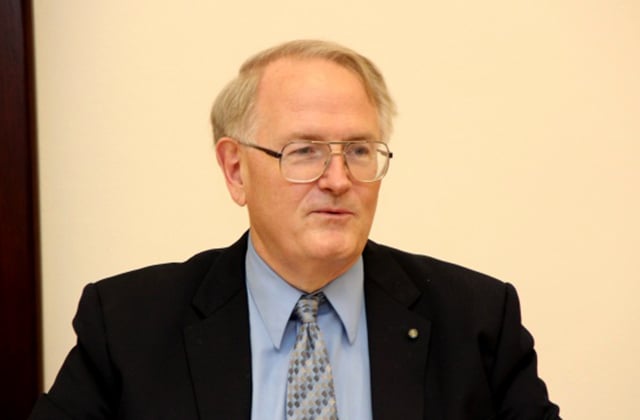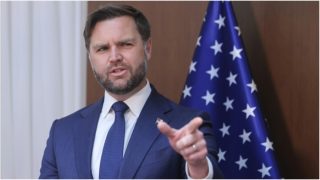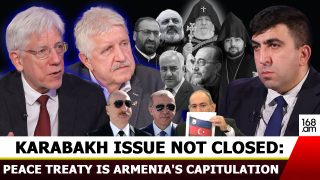Armenia Needs to Pursue More Balanced Foreign Policy: Paul A.Goble

Interview with Paul A.Goble, special adviser to Secretary of State (1990s), prominent Analyst on Soviet Nationalities, presently Professor at the Institute of World Politics (IWP). It’s noteworthy to mention, Paul A.Goble has worked as the Director of Research and Publications at Azerbaijan Diplomatic Academy (Minister of Foreign Affairs of Azerbaijan) for many years.
Mr. Goble the last few months were rather difficult for Armenia. The situation escalated in April on NK conflict zone leading to Karabakh second four-day war. On July 17 “Sasna Tsrer” group seized the Police precinct claiming resignation of RA president Serzh Sargsyan and cancellation of negotiations, which presuppose withdrawal of territories in NK conflict peaceful settlement process. In your opinion why the protest against the authorities obtained such radical manifestations?
I think there have always been people in Armenia, who have been unwilling to support any moods towards resolution what is usually called a Karabakh dispute. I think, however, that several developments in recent months, in addition to April four-day war, have played a role and have created the situation, which is likely to lead to more instability in Armenia, than in the past. These are the recent events, first in Turkey in Ankara, shift from being almost military opponent of the Russian Government to be much friendlier Government.
The second one, the increasing willingness of the Russian Government to see Baku as its chief partner in the South Caucasus and the third one, the increasing desire of people in the Armenian Government to explore better ties with European Union (EU) and the U.S.
I believe that Moscow has always thought that Armenia would stay in the Russian call, no matter what historically the Armenians feel surrounded by Turks and they have no choice, but the recent changes in the international environment have been that some in Armenia are prepared to look to the West, to look the foreign new vector of relations. I believe that the events of the last few weeks in Yerevan, the violence and the Government’s suppression of that violence were, if not inspired, at least encouraged by Moscow with the desire to force the head of Armenian Government to suppress any popular opposition.
That the act of suppression would make it far more difficult for Armenia to develop good relations with EU and U.S. and leave Armenia with fewer choices including almost certainly the choice the only one remaining the Moscow’s view would be for Yerevan to return to Moscow’s call, even though in recent months Moscow has been pursuing a policy in the South Caucasus which is anything but Armenia friendly.
The day prior to their surrender, one of the group leaders said they’ll continue their fight against Armenia’s decolonization, meaning Armenia’s dependency from Russia. What does this claim speak of? What conclusions should draw Armenia’s authorities, as well as those of Russia from developments in Yerevan and these claims?
The fact is that there are many people in Armenia were no happy with the Armenian Government’s close ties with Moscow, because they see that Moscow has been prepared to sell out Armenia from Armenia’s point of view and this is an underlying sense of many, I think to be. What I think need to remember is that for Moscow’s point of view radicals on that side are just as useful as pro-Moscow radicals, perhaps more useful to the extent, that they force the Armenian Government to behave in a tougher, harsher manner because it’s the Government’s response to those kinds of things that is going to be evaluated in the West and have, perhaps, negative consequences at least in Moscow’s expectations and hopes.
So Russian government in Ukraine, for example, often penetrated and made use of the most pro-Ukrainian and anti-Russian groups in order to create a situation which benefited Russia. I don’t see any reason to think that the Russian Government isn’t doing the same thing in Armenia. I think Armenia is in a very very tough position, because Moscow now with its increasing cooperation with Turkey on the one hand, and its increasing cooperation with Azerbaijan and Iran on the other, is no longer in the position of being able to rely on Moscow’s qualified support, when a country gets to that point it’s not accidental that many people begin to question the policies that the government has had in place.
Mr. Goble, after the April war Russia initiated a new negotiation cycle, during which information was being circulated that there is Lavrov or other Russian plan resembling Kazan document. After the meeting in St. Petersburg the presidents will again meet in Russia, and at this stage RF FM press speaker Maria Zakharova states, that Turkey may have a positive investment in NK conflict peaceful settlement. What does this mean for NK conflict against the background of Russia-Turkey rapprochement?
I think Russian policy has been fairly consistent in its desires of Russia’s being ultimate arbiter of what happens in the South Caucasus that it’s the idea of a two-stage process that the resolution of the dispute between Armenia and Azerbaijan has been something that Russian officials have talked about for some time. And involving Turkey almost certainly is a means to get Azerbaijan on board if Turkey comes to support the Russian position whatever it ends up, the final details that have been that will make it more likely that Azerbaijan will agree having said that we’re a long way seems to me from any resolution of this conflict and that the expectations that are being created are they rapid solutions, just as expectations have occasionally increased in the past is likely only to intensify debates within Armenian society and politics. As to what Armenia’s position should be that will all fit into the kind of conflicts that we have seen over the last months.
How do you assess the position of the U.S. in these developments?
I’ve never been an enthusiast for the Minsk Group because I thought it was a recipe for delay, although all talks are good, it’s important. I believe that just as Russian Government has now moved outside of the Minsk context, whatever it says to try to pursue its international interests in the South Caucasus. I think the U.S. should be more active than it has been in doing the same.
I think our national interests involve strong independent Azerbaijan and strong and independent Armenia and I don’t think that it’s Russia’s goal and I think that to the extent that we want to see peace and stability in the South Caucasus. We should be pursuing both of those goals, it’s not easy, it won’t be achieved immediately, it’s going to be difficult for people in both countries and both governments, but I believe that U.S. have both the capacity and the obligation to try to promote them.
You have authored an article entitled “Moscow ‘bypassing’ Armenia to reach Azerbaijan, Iran and India.” You know, that president Putin will visit Azerbaijan to hold trilateral negotiations, the next day he’ll meet Erdogan. In your opinion what’s going on in the region, how may Armenia be singled out in these plans?
I think we have to start with the fact that Armenia is located from its point of view in bad neighborhood.it would be easier for Armenia to be located somewhere else but that would be a different situation. The former president of Estonia once said I’d rather have Canada for a neighbor and undoubtedly would have other countries with their neighborhood than the ones they have. Armenia has a very difficult geo-political situation just by virtue of where it is and what neighbors are.
I believe what I wrote in the article that Moscow has always operated that principle, which was articulated twenty years ago by Azerbaijani official [Vafa Guluzade] that in the South Caucasus Georgia is the way, Armenia is the tool and Azerbaijan is the gift. Armenia has always assumed that in their relatively week geo-political position, the only place they can look is to Moscow. And what we’re now seeing is that Moscow is moving the situation where it tried to take Armenia for granted and things are in the direction of other countries in the South Caucasus.
I believe, that Armenia needs to pursue a more balanced foreign policy, one that tries to involve Western powers, the EU in particular, because I think what we’ve seen in the last months and weeks shows that Armenia tries to rely on Russia alone, it is going to be an Armenia, that Moscow will at some point sacrifice if it believes that by doing that it can establish much bigger presence in Azerbaijan and its relationships with Turkey and Iran.
How do you imagine Western involvement in Armenia, when Armenia faces security issues and Moscow claims that it provides those guarantees to Armenia despite the quality?
I’d like to quote another Caucasian official, former Georgian FM Tedo Japaridze, who some years ago observed that in the future well-being and standards of the country will be determined by the very best hotels, rather than having best tanks. It seems to me that Armenia has a balanced policy and is more integrated with the West, with having much better chance of becoming an IT center or something else and that thinking about security only in the old way, only in terms of military string, only in terms of bases doesn’t get us further. I think the events of the last 6 months, the events of the 72 hours ago confirm that I don’t think that presence of a Russian military base on the territory of Armenia guarantees that Moscow will support what Armenia wants.
That doesn’t mean that the West will support Armenia in any case either, but I think old way of thinking of bases and alliances is not going to be the best solution to Armenia’s problems.
I believe if Armenia was dynamic, had a dynamically growing economy was attracting Armenians back to Armenia rather than seeing the emigration of so many looking for work, I think that would do a lot more to strengthen Armenia than concerns about military or force structures more generally.
And I believe that if one looks around at the world at those two places where their support for that kind of economic development are provided—in the EU and the U.S. and not in Russia with its own economy, as an expert said earlier this week Russia is going deeper.
So, I think that Armenia needs to think very seriously in the future and I think that in more balanced approach and possibly very new thinking about what comes to international security is something Armenia should be thinking about. That’s my view.
By Araks Martirosyan

























